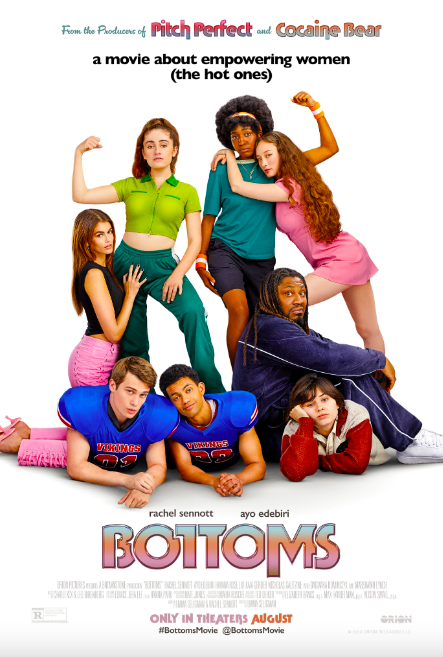Photo Credit: IMDb
Could anyone have expected a queer fight club?
Kiera Quinlivan, Contributor
One fateful September afternoon, my friends and I were discussing our plans for the evening. “I’m going to the 10 o’clock showing of Bottoms,” I said. “No way, I’m also seeing Bottoms at 10!” she replied. “Wait me too!” exclaimed another. We turned to the last friend. “I’m not going at 10,” she answered sadly.“I’m going to the 7:20 showing.”
How is it that four people can all individually decide to see the same movie on the same day? It could just have been random probability, but I think we all chose to see Bottoms because there was something about it that called to us. Some niche that it filled that we didn’t know was empty until we saw the trailers for the movie.
After I first came out as bisexual, I started watching queer classics like But I’m a Cheerleader and the oft-overlooked D.E.B.S. These films hold a special place in my heart for their unapologetic focus on queer women’s platonic and romantic relationships, and their willingness to poke fun at the absurdity of heteronormative society. While I love a good lesbian period drama as much as anyone, I’ve always wondered, “What happened to the campy lesbian movie?”
Enter Bottoms. I had known from the trailers that it would be campy, but I didn’t expect the sheer insanity that was this film. Parodying the stereotypical American high school, Bottoms is filled with absurd characters like the teacher who overshares about his divorce and the star football player solely referred to as “Jeff”. Even its two protagonists, PJ and Josie, played by Rachel Sennott and Ayo Edebiri, are fully entrenched in the film’s campiness, forming a women’s fight club to seduce their crushes. Bottom’s craziness is amplified by the presence of Marshawn Lynch, a retired NFL football player who makes his acting debut in the film. Just knowing that a former Seattle Seahawks running back is in a movie about a queer fight club was enough to make me burst out laughing.
Every second of Bottoms’ 90-minute runtime was packed with jokes. Like all comedy, the mileage on each joke varied, but writers Emma Seligman and Rachel Sennott knew their audience well. My theatre erupted in laughter when Bottoms was at its most ridiculous and its most queer, and I found myself cherishing the experience. After watching But I’m A Cheerleader alone in my bedroom, there was something special about watching Bottoms surrounded by people.
Bottoms didn’t seem to be interested in making any larger critique of the world that it satirized, but sometimes a movie doesn’t need to have a deep message about society. Bottoms is a refreshing reminder that not all queer films have to be about loss, suffering, and struggle, queer movies can also be about solidarity, friendship, and fight clubs.



